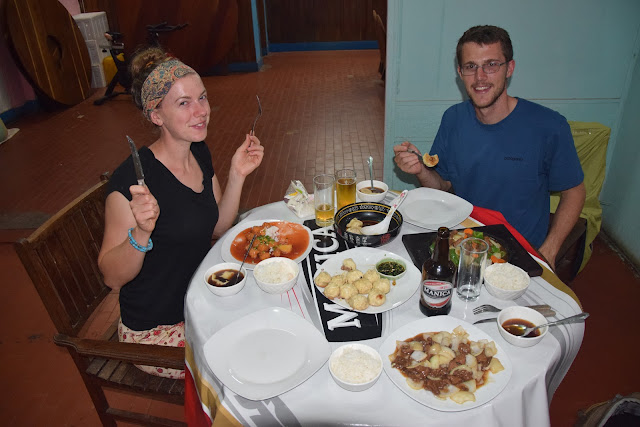I've never enjoyed being called "boss" in the United States and I don't like it here either. However, there is a huge difference between the "boss" of the U.S. and the "patrão" of Mozambique.
The American "boss" is usually meant somewhat sarcastically and is usually either said tongue-in-cheek or as an extremely informal, let's-be-buds-or-at-least-talk-like-we-are sorta fashion. It's annoying. When adults call me boss. When peers call me boss. When Siri or any sort of electronic voice meant to better my quality of life calls me boss. When my boss calls me boss (which somehow actually happens in our culture?!) Boss is bad anytime it's not said in the context of the workplace in the fashion and with the respect, but not compromising of dignity and agency, which which it was meant to be said.
The American "boss" is usually meant somewhat sarcastically and is usually either said tongue-in-cheek or as an extremely informal, let's-be-buds-or-at-least-talk-like-we-are sorta fashion. It's annoying. When adults call me boss. When peers call me boss. When Siri or any sort of electronic voice meant to better my quality of life calls me boss. When my boss calls me boss (which somehow actually happens in our culture?!) Boss is bad anytime it's not said in the context of the workplace in the fashion and with the respect, but not compromising of dignity and agency, which which it was meant to be said.
In Mozambique, "patrão" is far from a simple, surface-level, chummy nickname. Patrão comes with all sorts of social, economical and oftentimes racial connotations, most of which are not maybe immediately obvious or consciously intended. Here I am "Patrão" because I am a white male, a foreigner perceived to have money. It's said oftentimes in an almost subservient manner and is almost always followed by a request for money, a job or any other necessity that the individual might have at the time. That's not to say that Mozambicans aren't called "patrão", because I know countless who are. But they have taken their "patrão" and often molded it into becoming their title. Their "patrão" is the result of them owning a car, employing others, firing others on a whim, wearing foreign clothing or accessories, walking with their shoulders back in a way that makes people think twice before approaching them and then affirming this indecision when they reply with short, cold phrases to anyone who starts a conversation. This doesn't paint a pretty picture of being a "patrão" here and that's because it isn't; my experience so far is that, aside from a very select few leaders who I respect, in a country in which poverty is such a problem those who have in some way risen above it tend to want to 1) make sure everyone knows, and 2) distance themselves from those who haven't. Like I said, this is by no means everyone.
You might be thinking this doesn't sound so different from in the U.S. I might respond by mentioning it could be interesting to study how the capitalism we tend to export around the world manifests itself in different countries and cultures. Fun fact: "boss" is one of the handful of English words adopted into and used by both the Portuguese and local language speakers at my site. It is important to quickly note that Portuguese colonialism has had a huge effect on everything we are discussing, as has current foreign investment that is heavily Asian and predominantly Chinese.
Without getting too deep into it all, I've never considered myself a boss in any language or country, nor have I up to this point had the desire to be identified as one. When and if I ever am, I would like it to be due to merit and I hope to be a both who sets himself apart from others who share the title through my treatment of and interactions with those who call me "boss"; every boss should first be a leader. That's not the case here. Here I am a boss to almost any stranger due to the color of my skin and the long list of conclusions it allows others to formulate about me. Unfortunately, there's not much that can be done about this, but to slowly attempt to break down stereotypes person by person.
"Muito bom dia! Como está, o Patrão?"
"Onde? E não sou patrão, mas estou bem...e você? Como vai?"
You might be thinking this doesn't sound so different from in the U.S. I might respond by mentioning it could be interesting to study how the capitalism we tend to export around the world manifests itself in different countries and cultures. Fun fact: "boss" is one of the handful of English words adopted into and used by both the Portuguese and local language speakers at my site. It is important to quickly note that Portuguese colonialism has had a huge effect on everything we are discussing, as has current foreign investment that is heavily Asian and predominantly Chinese.
Without getting too deep into it all, I've never considered myself a boss in any language or country, nor have I up to this point had the desire to be identified as one. When and if I ever am, I would like it to be due to merit and I hope to be a both who sets himself apart from others who share the title through my treatment of and interactions with those who call me "boss"; every boss should first be a leader. That's not the case here. Here I am a boss to almost any stranger due to the color of my skin and the long list of conclusions it allows others to formulate about me. Unfortunately, there's not much that can be done about this, but to slowly attempt to break down stereotypes person by person.
"Muito bom dia! Como está, o Patrão?"
"Onde? E não sou patrão, mas estou bem...e você? Como vai?"
 |
| If anyone needed proof that this guy can't be taken seriously enough to be called "patrão"... |


















































